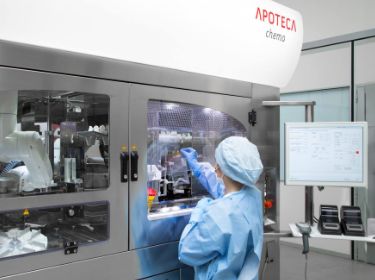Our Doctors
Meet all the doctors from Cleveland Clinic Abu Dhabi.
View Doctors

Thanks to advances in the field of cancer treatment, the Oncology Institute at Cleveland Clinic Abu Dhabi is now able to offer patients more precise, personalized, and effective approaches to radiation therapy.
Y-90 also known as Yttrium-90 Transarterial Radioembolization (TARE) is an advanced approach to embolizing liver tumors, which is changing the way patients are treated and offering new hope.
Y90 (Radioembolization) is an innovative and minimally invasive cancer treatment technique for those diagnosed with unresectable liver cancer; both primary and metastatic.
Radioembolization as a treatment option combines the use of trans arterial embolization and radiation therapy. Trans arterial therapy is a minimally invasive treatment that targets specific areas in the liver. The combination of this approach with targeted internal radiation therapy (radiation which is delivered inside the body) delivers very precise radiation with the use of tiny radioactive particles or beads directly to the blood vessels that feed the tumor (cancerous cells).
Evaluation and Planning: Before Radioembolization, healthcare teams will perform a comprehensive evaluation to determine if you are a suitable candidate for the procedure. This evaluation may include imaging tests, blood tests, and discussions about your medical history.
Trans arterial embolization: During the procedure, a small incision (cut) is made on the inner thigh so a thin flexible tube (catheter) can be inserted. This catheter is then guided into an artery to access the tumor (cancerous cells).
Selective Internal Radiation Therapy: During the procedure, small beads called microspheres containing a radioactive substance called yttrium-90 (Y90) are injected into the blood vessels that supply the liver tumor/s. These microspheres lodge in the small blood vessels within the tumor/s, delivering targeted radiation therapy directly to the cancer cells while sparing healthy liver tissue.
Precise Radiation Delivery: The Y90 microspheres emit radiation, which penetrates the tumor cells and destroys them from within. The radiation primarily affects the tumor, minimizing damage to surrounding healthy liver tissue.
Ongoing Monitoring and Care: After the procedure, healthcare teams will closely monitor the patient’s progress and provide necessary follow-up care. They will assess treatment response, manage any side effects, and tailor subsequent treatments as required.
Benefits of Radioembolization TARE-Y90 Therapy
Targeted Treatment: Radioembolization delivers radiation therapy directly to the liver tumors, maximizing tumor cell destruction while sparing healthy liver tissue. This targeted approach can lead to improved outcomes and enhanced quality of life for patients.
Minimally Invasive: Radioembolization is a minimally invasive procedure that typically requires only a small incision and local anesthesia. This approach results in reduced pain, shorter recovery times, and fewer complications compared to traditional surgical interventions.
Compatible with Other Treatments: Radioembolization can be used in combination with other cancer treatments, such as chemotherapy or targeted therapies, to provide a comprehensive and multimodal approach to cancer care.
Potential for Prolonged Survival: Studies have shown that Radioembolization may offer improved overall survival rates and disease control for certain patients with liver cancer or metastatic liver tumors, especially when combined with other treatment modalities.
Radioembolization may be a suitable treatment option for patients with primary liver cancer or metastatic liver tumors.
Whether or not a patient is a candidate for the treatment will depend on several factors, including tumor characteristics, liver function, overall health, and treatment goals. A multidisciplinary team, including interventional radiologists and oncologists, will evaluate each patient’s unique situation and recommend the most appropriate treatment plan.
Radioembolization, or TARE-Y90 Therapy, represents a significant advancement in the field of cancer treatment for liver cancers. If you have been diagnosed with liver cancer, talk to your doctor about the options available to you and together, you can decide on the best course of treatment.
We’re here to make managing your healthcare easier.